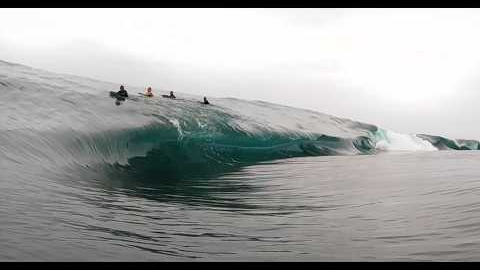MUTANT SLABS IN TAHITI // LOCAL ZONES off the Beaten Track // Bodyboarding & Surfing
23,805 View
Share this Video
- Publish Date:
- August 23, 2025
- Category:
- Surfing
- Video License
- Standard License
- Imported From:
- Youtube
Tags

TAHITI HAS WAY MORE TO OFFER THAN JUST TEAHUPOO
Almost 40 minutes of action with two local legends and friends, Manua Menard & Nils Aubelle. This "Best of" edit showcases the lesser known spots that dot Tahiti's coastlines, from shallow death slabs to fun shorebreaks and reef passes, there is even a little bit of Teahupoo thrown in for good measure! Sit back, relax and enjoy the show.
Nils Aubelle // https://www.instagram.com/pasdchal @MAHANASURFCOLLECTIVE // Manua Menard
https://www.instagram.com/birdmessengerofwaves/
Edit: We Bodyboard
Music (in order)
Such a Bang - Sven Karlsson
Sonata No. 14 'Moonlight' - Ludwig van Beethoven
Power Trip - Dillon Knighton
Domo Arigato - Lofive
Shame (Instrumental Version) - Carvings
Book of Revelations (Instrumental Version) - Psuche
Chapter 13 - Nihoni
Gold in Our Pockets (Instrumental Version) - Tigerblood Jewel
Act Calm - OTE
Devolition - Def Lev
Moondust Harvest - Of Water
2099 - Wave SaverRenaissance - damnsonic
Samadhi (Alpha 10 hz) - SyntropyIn And Out Of Love (Tigerblood Jewel Remix) - The Eastern Plain
Waves of Time - Amber GlowThe Spell I'm Under - HoneycuttsChasing Self - Polar Nights
Support We Bodyboard and grab some sick merch here: https://we-bodyboard-shop.fourthwall.com/
Join this channel to get access to perks and support the sport.
https://www.youtube.com/channel/UCL6usCVj8wV_j2LeY7pO1DA/join
Alternatively, if you like, you can simply pay for some website server time/buy me a beer using this link: https://www.paypal.com/paypalme/webodyboard
All support is super appreciated, cheers legends - Jason
-----------------------------------
Barrier Builders: Tidal Sediment and Erosion Sculpting Coastal Sandbar Formations and Shoals
Understanding Sandbar Formations
Sandbar formations are fascinating natural structures that play a crucial role in shaping our coastal landscapes. These underwater ridges, composed primarily of sediment, are formed by the continuous action of tides and currents. As tidal waters move in and out, they transport and deposit sediment, gradually building up these barriers and shoals that define the coastal regions.
The Role of Tidal Forces
Tidal forces are the primary drivers behind the formation of sandbars. The ebb and flow of tides create dynamic water movements that redistribute sediment along the coastline. During high tide, water levels rise, allowing sediment to spread out, while low tide exposes these sediments, leading to their accumulation in specific areas. This cyclic process is essential in shaping the barriers and shoals that protect inland areas from the direct impact of ocean waves.
Sediment Distribution and Coastal Protection
Sediment plays a pivotal role in the development of sandbar formations. The size, type, and availability of sediment materials determine the stability and growth of these structures. Fine sands tend to form extensive, gentle sandbars, while coarser materials can lead to the creation of more resilient and pronounced barriers. These sandbars act as natural buffers, absorbing wave energy and reducing coastal erosion, thereby safeguarding coastal ecosystems and human settlements.
Erosion and its Impact on Sandbar Stability
Erosion is a natural process that influences the longevity and shape of sandbar formations. Strong wave action and storm events can erode these barriers, altering their structure and position. However, erosion also contributes to the continuous reshaping and dynamic nature of coastal environments. Understanding the balance between sediment deposition and erosion is key to managing and conserving these valuable coastal features.
Barriers and Shoals: Distinguishing Features
While often used interchangeably, barriers and shoals have distinct characteristics. Barriers are elongated landforms that run parallel to the coastline, providing significant protection from oceanic forces. Shoals, on the other hand, are elevated areas of shallow water that can extend offshore, posing navigation challenges but also contributing to coastal protection. Both barriers and shoals are integral components of the complex interplay between tidal movements, sediment supply, and coastal dynamics.
The Future of Sandbar Formations
As coastal areas face increasing pressures from human activities and climate change, understanding the formation and maintenance of sandbars becomes more critical. Sustainable coastal management practices are essential to preserve these natural barriers, ensuring they continue to provide protection and maintain the ecological balance. Future research and innovative conservation strategies will play a vital role in safeguarding sandbar formations for generations to come.
Did you miss our previous article...
https://trendinginhawaii.com/surfing/waikiki-surfing-surfing-videos-may-5-2025-2-pinata-by-el-neon-surf-videos-surfer-girls














